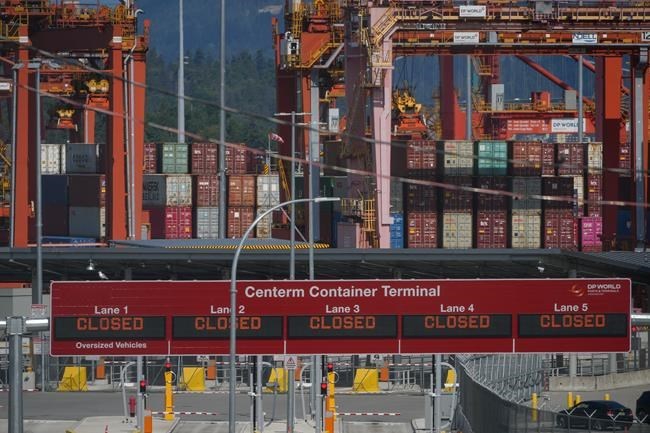MONTREAL — Railways suffered a sharp drop-off in container shipments this month as the strike by B.C. port workers — now poised to end after a tentative deal Thursday — halted more than half of steel-box cargo.
Canadian National Railway Co.'s revenue ton miles — a key industry metric used to gauge income and freight volume — fell 60 per cent in the first week of the job action, according to RBC Dominion Securities analyst Walter Spracklin.
The figure dropped by 45 per cent at Canadian Pacific Kansas City Ltd.
The plunge left the number of containers hauled by Canadian railways last week at barely half the level it reached during the same period in 2022, according to the American Railroad Association.
The corrugated metal boxes, which carry everything from consumer products to auto parts, mark a critical source of cash for Canada's two main railways, comprising roughly one-quarter of annual revenue.
But railways, a land lifeline for the ports, breathed a sigh of relief Thursday after the International Longshore and Warehouse Union Canada and the BC Maritime Employers Association struck a tentative agreement based on a federal mediator's recommendations.
Some 7,400 waterfront workers walked off the job on July 1, with wages, automation and contracting out as the key sticking points in negotiations. For 13 days, the strike halted shipments in and out of about 30 ports in British Columbia, including the Port of Vancouver — Canada's largest.
Nonetheless, Spracklin said the big dent in container cargo would likely impact railway earnings, as 37 per cent of CN's total carloads originate in Vancouver and Prince Rupert, B.C. About 20 per cent of CP's shipments roll through Vancouver docks.
"That said, we note that in the past, external disruptions including cold weather, blockades, and strikes have not affected share prices or valuation at the Canadian rails, despite the resulting (temporary) negative impact on quarterly results," Spracklin said in a note to investors.
Grain products also continued to flow abroad throughout the strike, in line with rules under the Canada Labour Code.
The effect of stalled containers rippled beyond the tracks, hitting small business owners particularly hard. The Canadian Federation of Independent Business said earlier this week that more than half of businesses it surveyed will see their operations affected by the labour action.
Paul Edgerton, founder of PureLite Glass in Ajax, Ont., said 60 per cent of the materials he uses to make windows for homes and commercial buildings come from Asia via the West Coast.
"That's already starting to run out," he said. "And the recovery period is going to be at least four weeks."
Of equal concern are the manufacturer's 21 employees. "How am I going to help them feed their families and pay their bills when I can't make a sale? Because I have no product to sell."
The materials PureLite uses on range from glass to polysulfide and silicone, all of it imported.
"Many of our forwarders, they've taken the vessel name completely off of the bill of lading. So we don't even know what boat it's going to go on — there's no date when it's going to arrive," Edgerton said.
Components from alternate source countries such as the United States are either unavailable or "through the roof in price."
"It has a tremendous impact," he said — even with the strike poised to wind down.
The tentative four-year deal remains subject to ratification by both parties, the employers association said in a statement Thursday.
Dan Kelly, CEO of the Canadian Federation of Independent Business, said the past two weeks were "painful and stress for small businesses," which have fewer resources and less leverage to lean on.
Those in manufacturing, wholesale and retail were most affected, with two-thirds or more feeling the impact, according to its survey.
"Now is the time to get the economy rolling, clear the backlog and get shipments moving as soon and as quickly as possible. Even if port activities resume today, it will take months before the supply chain backlog created by the strike is fully addressed," Kelly said in a statement.
This report by The Canadian Press was first published July 13, 2023.
Companies in this story: (TSX:CNR, TSX:CP)
Christopher Reynolds, The Canadian Press




